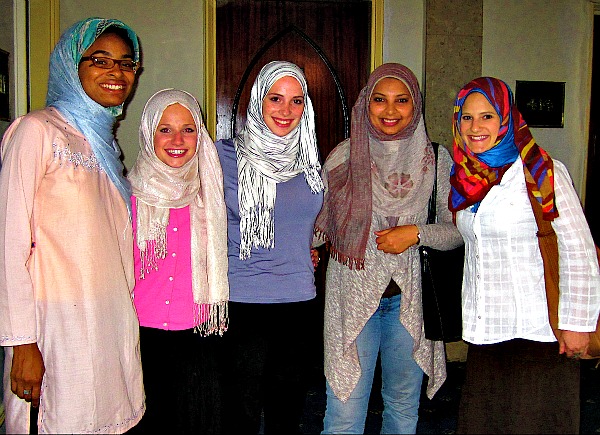Clicking through the archives of the Washington Post with a steaming cup of coffee in hand, I came across an article written by Martha McSally, an Air Force lieutenant colonel who served in Saudi Arabia. Her article, entitled “Why American troops in Afghanistan shouldn’t have to wear headscarves” responds to the current military policy recommending women don hijabs, or headscarves, in Afghanistan. I was intrigued, especially as a woman who has lived extensively in the Middle East and a current Middle Eastern Studies student.
McSally argues that American women in the armed forces should not be pressured to perform a foreign cultural practice if it conflicts with their American values. Her personal narrative revealed her battle with Congress to revoke a mandate that pressured women to wear hijabs outside of the army base. She won her battle, but her war is just beginning. She explains wearing the headscarf “violated the U.S. constitutional values I pledged to defend and degraded military order and cohesion.” After living in the Middle East for several years, I understand where her frustration stemmed from. I had been forced to wear a hijab on several occasions myself, not only as a sign of culture respect, but for safety. While I empathize, I also vehemently disagree with McSally’s headscarf argument.
McSally framed her argument around her constitutional rights and her frustration with the lack of gender equality in the Middle East. I too, am an American woman. I also believe my constitution grants me certain freedoms. I do not, however, expect my values to be prioritized in a country that is not my own. I come as a guest to another country. McSally was a guest, and as such, should enter with the respect and tolerance of a visitor.
As a member of the armed forces, McSally’s job is to follow military orders. Such orders in Afghanistan involve relating to the local population. Part of American foreign policy, as McSally admits, is to “reach out to local Afghan women and win their hearts and minds as part of the new counterinsurgency strategy.”
But this is a matter greater than merely following orders. Now that American forces are pulling back in Afghanistan, establishing relationships is more critical than ever. Laying foundations for meaningful dialogue and working relationships will go a long way in strategic relations between the two countries. This is not to say wearing a hijab will act as a magical solution to introduce deep intercultural communication. It is naïve to suggest the hijab eradicates other barriers that exist between American and Afghani women. But it is also naïve to suggest not wearing hijabs will improve attempts at strengthening intercultural dialogue. If American women show their hair publicly, they attract unwanted attention and become isolated, especially outside major cities. It is culturally unacceptable for men to engage with uncovered women, and similarly unacceptable for Afghani women to be associated with immoral, uncovered women. American women must be seen as respectable for dialogue to have a serious impact.
Afghani women understand that the hijab is considered a symbol of oppression in the western world, while it is a symbol of piety in Afghanistan. This makes it all the more meaningful to Afghani women when American women choose to relate to local women and venture outside of their comfort zones, engaging on personal terms instead of cultural ones. In a war where American presence is not always welcome, American female soldiers reaching out to Afghani women is a critical part of our counterinsurgency strategy. Thus, American female soldiers should wear headscarves to initiate the kind of relationships that will build strong bridges and provide the U.S. an opportunity to win the war long after the last tank has departed. This approach will long outlive the alternative– likening cultural norms like the hijab to a mere symbol of female oppression. Taking the later approach would be a huge mistake, one that would hurt American efforts in Afghanistan.
In a post 9/11 world, the rules of engagement have changed. The ways we fight wars have changed. It is through these new approaches to cultural engagement that we must find some middle ground. Winning this long war means developing new strategies, which should include interpersonal communication and engagement between cultures. We are entering a new era of American foreign policy, one where land conquests are irrelevant. We must truly win the hearts and minds of the people we seek to influence. This process can only begin when Americans take steps to advance on the battlefield, charging into new territory: the Afghani culture.

